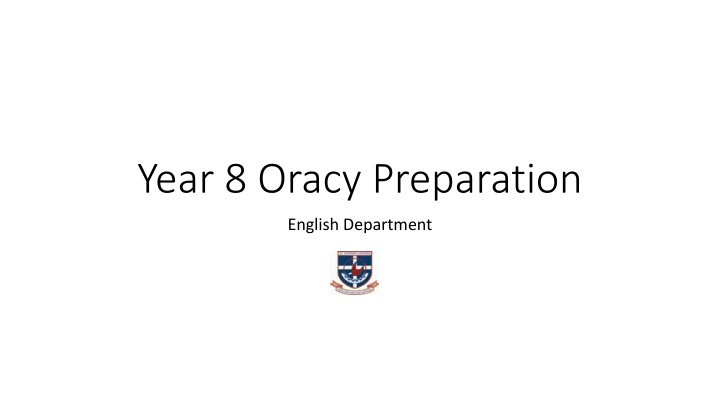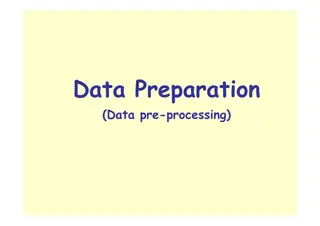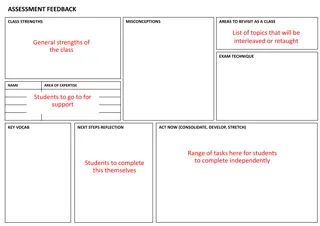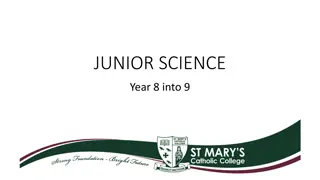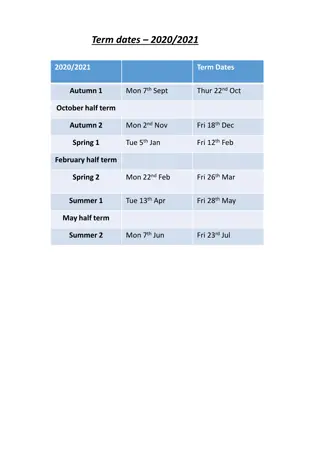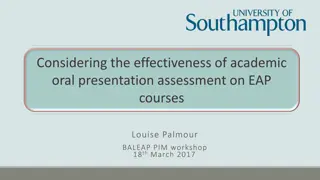Oracy Preparation for Year 8 Students
Engage in various speaking activities, such as personal involvement talks, prepared read-alouds, and memorized interpretations, to enhance communication skills and confidence. Students present their interests, read passages fluently, and perform dramatic interpretations or role plays. This English department program focuses on clear communication, structured presentations, and engaging delivery techniques using visual aids and verbal expressions.
Download Presentation

Please find below an Image/Link to download the presentation.
The content on the website is provided AS IS for your information and personal use only. It may not be sold, licensed, or shared on other websites without obtaining consent from the author.If you encounter any issues during the download, it is possible that the publisher has removed the file from their server.
You are allowed to download the files provided on this website for personal or commercial use, subject to the condition that they are used lawfully. All files are the property of their respective owners.
The content on the website is provided AS IS for your information and personal use only. It may not be sold, licensed, or shared on other websites without obtaining consent from the author.
E N D
Presentation Transcript
Year 8 Oracy Preparation English Department
Section 1: PERSONAL INVOLVEMENT Section 1: PERSONAL INVOLVEMENT not to exceed 4 minutes Plan and present a talk on any subject or skill in which you are interested and/or personally involved. This should be a prepared talk, demonstrating research and/or inquiry. The use of visual material will remove a memorised essay style of presentation.
Section 1: Criteria Section 1: Criteria You must show that you can structure your talk clearly and logically within the given time limit include your own ideas and opinions as well as the facts communicate spontaneously do not rely on notes, read or memorise an essay use appropriate visual aids to enhance your presentation speak out audibly and clearly communicate with the listeners enthusiastically and sincerely
Section 2: PREPARED READING ALOUD Section 2: PREPARED READING ALOUD not to exceed 2 minutes Introduce and read for the pleasure of the listening group a prepared passage from a story that you have read and enjoyed.
Section 2: Criteria You must show that you can select a passage from your story that contains dialogue introduce the passage placing it in the context of the story read aloud fluently with appropriate verbal expression (verbal communication skills) use appropriate emphasis, phrasing, pace and pauses to reflect awareness of meaning use effective eye contact to enhance involvement with the listeners(non verbal communication skills) use imagination to communicate the mood and meaning effectively to enhance involvement with the listeners use imagination to bring the scene to life for the listener
Section 3: MEMORISED INTERPRETATION Section 3: MEMORISED INTERPRETATION PROSE POETRY Present a script-free interpretation of either poetry or prose. If working with a group 2 minute per student. Maximum 4 in a group. or DRAMA Present alone or with a group (maximum 4) a memorised dramatic presentation either scripted or self devised drama.. or ROLE PLAY: ON LOCATION TV REPORT Prepare and present an on location TV verbal report informing listeners about an incident of your choice. This memorised report must demonstrate research and the techniques required for this type of presentation not to exceed 3 minutes
Section 3: Criteria You must show that you can communicate your choice to the listeners script free respond vocally and physically use imagination to re-create the scene for the listeners communicate the mood and meaning share your choice with confidence, vitality and enthusiasm
Section 4: DISCUSSION Section 4: DISCUSSION Listen and answer questions, related to your program, arising from the assessor and the audience. You will be expected to comment on, question and discuss points raised by other students in their presentations.
Section 4: Criteria You must show that you can listen carefully to questions respond with extended information ( not mono-syllabic answers) listen, question and discuss points raised by other students in their presentations learn from each other be confident, clear and courteous when communicating to your listeners
Level of Achievement Level of Achievement An individual report will be awarded stating the result of each section: Satisfactory, High, Very High or Outstanding. The overall result will be an aggregate. Section 1 will carry double weighting. Section 1 and Section 3 may be presented solo or as part of a pair or a small group (maximum 4)
